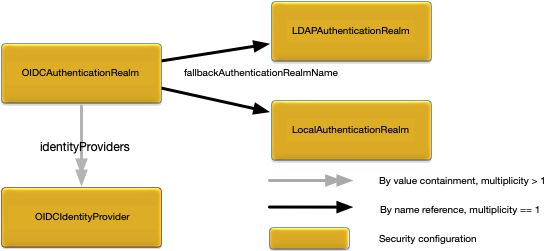Contents
The OpenID Connect (OIDC) authentication realm allows authentication with an OIDC provider. OIDC is an identity layer on top of the OAuth 2.0 protocol, which allows single sign-on for clients to verify your identity based on the authentication performed by an authorization server. The following identity providers are supported:
-
Auth0
-
Google Identity Platform
-
Microsoft Azure Active Directory
An OIDC realm configuration is specified in an OIDCAuthenticationRealm root object in the security configuration type.
OIDC is only supported via the HTTP protocol; non-HTTP communication is not supported. The StreamBase OIDC implementation only supports authentication, and not authorization. Each OIDC realm configuration must specify a fallback realm that is used for all authorization and for authentication from clients that are not using HTTP. That fallback realm must exist when the OIDC realm is activated or activation fails.
OIDC requires at least one identity provider configuration. For each identity provider:
- documentDiscoveryUrl
-
A URL used to retrieve information about the identity provider.
- clientId
-
The OIDC client's authentication ID.
- clientSecret
-
The OIDC client's authentication secret key, optionally encrypted with epadmin encrypt secret.
- identityAttributeName
-
The attribute in an authenticated user's JSON web token (JWT) that identifies a user name that can be mapped to a set of roles in the fallback realm for authorization purposes.
The OIDCAuthenticationRealm root configuration object defines OpenId Connect authentication for a node. Figure 1, “OIDCAuthenticationRealm relationships” shows the relationships to other configuration objects.
A detailed description of the configuration object properties is in OIDCAuthenticationRealm object properties and a snippet for these properties is in Example 1, “OIDCAuthenticationRealm object snippet”.
OIDCAuthenticationRealm object properties
| Name | Type | Description |
|---|---|---|
|
String | The default address to redirect a user to after authentication if no redirect URL was provided in the authentication request. Optional. Default value is null. |
|
Associative array of OIDCIdentityProvider configuration objects keyed by identity provider names.
|
An associative array of OIDCIdentityProvider (see OIDCIdentityProvider object properties) configuration objects indexed by provider names. Provider names must be URL safe and non-empty. Required.
|
|
String | The name of the realm used for all authorization. This must be the name of an active LDAPAuthenticationRealm or LocalAuthenticationRealm. If the fallback realm is not defined, configuration activation will fail. Required.
|
|
String | Name of the authentication realm. This name must be unique across all authentication realms. Required. |
|
Integer | The amount of time to wait for a provider's response in seconds before timing out. Optional. Default is 300 seconds. |
|
Boolean | A value of true only allows users to connect from a trusted host, a value of false allows users to connect from any host. Optional. Default value is |
Example 1. OIDCAuthenticationRealm object snippet
name = "oidc-authentication-realm"
version = "1.0.0"
type = "com.tibco.ep.dtm.configuration.security"
configuration =
{
OIDCAuthenticationRealm =
{
name = "my-oidc-authentication-realm"
requireTrustedHostMembership = false
defaultRedirectURL = "http://redirect.acme.com"
fallbackAuthenticationRealmName = "my-ldap-realm"
pendingAuthenticationTimeoutSeconds = 600
identityProviders =
{
"Google" = { ... }
"Auth0" = { ... }
}
}
}The OIDCIdentityProvider object defines the configuration for OpenId Connect providers.
Support is provided for federated identity providers like Auth0. Federated providers use subject prefixes to map to the actual
provider defined in this configuration. This mapping is configured using the subjectProviderMappings configuration property. For example:
//
// Subject provider mappings in Auth0 configuration
// A subject prefix of google-oauth2 maps to the
// configured "Google" identity provider
//
subjectProviderMappings =
{
"google-oauth2" = "Google"
}
//
// Auth0 identity contains "sub" claims
//
// The "|" is the delimiter, so "google-oauth2" is the prefix that
// identifies the actual provider providing the identity information.
// 105569619522230371597 is the subject for the principal from the identity
// provider represented by google-oauth2
//
sub: 'google-oauth2|105569619522230371597'
//
// The same principal authenticated directly against "Google"
// would have the same identity information in the "sub" field.
//
sub: '105569619522230371597'Figure 2, “OIDCIdentityProvider relationships” shows the relationships to other configuration objects.
A detailed description of the configuration object properties is in OIDCIdentityProvider object properties and a snippet for these properties is in Example 2, “OIDCIdentityProvider object snippet”.
OIDCIdentityProvider object properties
| Name | Type | Description |
|---|---|---|
|
String | The client's authentication identifier. Required |
|
String | The client's authentication secret key. Opaque passwords are generated using the epadmin secret target. See
epadmin-secret(1). Required.
|
|
String | The identity provider's Document Discovery URL for obtaining discovery information. Required. |
|
String | The attribute in a given principal's ID Token to be used as the identity for this principal. Required. |
|
Associative array of subject prefixes to identity provider names. | Map federated identity provider subject prefixes to configured identity provider names. The provider names must be configured
in this configuration. This field is only valid for federated identity providers like Auth0. Optional. Default is null (no mappings).
|
Example 2. OIDCIdentityProvider object snippet
name = "oidc-authentication-realm"
version = "1.0.0"
type = "com.tibco.ep.dtm.configuration.security"
configuration =
{
OIDCAuthenticationRealm =
{
identityProviders =
{
"Google" =
{
documentDiscoveryURL = "https://accounts.google.com/.well-known/openid-configuration"
clientID = "my-google-client-identifier"
clientSecret = "my-google-client-secret"
identityAttributeName = "email"
}
"Auth0" =
{
documentDiscoveryURL = "https://tibco.auth0.com/.well-known/openid-configuration"
clientID = "my-auth0-client-identifier"
clientSecret = "my-auth0-client-secret"
identityAttributeName = "email"
subjectProviderMappings =
{
"google-oauth2" = "Google"
}
}
}
}
}

